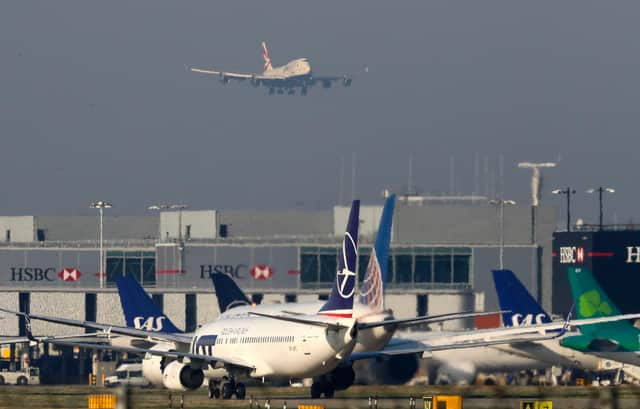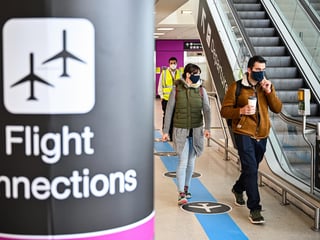Covid pandemic should see wealthy jet-set lose their frequent flyer privileges – Joyce McMillan


The Scottish government immediately went further, saying that restrictions would apply to all countries outside the UK and Ireland; meanwhile, the UK government began to book airport hotels for those in quarantine, and announced that their ten-day stays would cost them £1,750 each, with those who attempt to escape quarantine subject to a fine of up to £10,000.
The provisions arguably came almost exactly a year too late. The two “western” countries which have achieved outstanding success in controlling coronavirus, New Zealand and Australia – island nations like Britain and Ireland, although UK housing minister Grant Shapps seemed confused about that last week – closed their borders on 14 and 20 March, 2020 respectively, imposing immediate hotel quarantine regimes for arrivals.
Advertisement
Hide AdAdvertisement
Hide AdSince then, Australia has suffered 909 deaths associated with Covid-19, and New Zealand has suffered five, while the UK has notoriously lost 114,000 people according to the daily reported totals.
Proportional to our population, our pandemic has therefore been 50 times worse than Australia’s; and anyone looking at our deserted city centres, locked and shuttered businesses, closed shops and devastated employment prospects can see that the traces of that disaster will impact our economy, our lives and our international standing for years and even decades to come.
Yet even this week, backbench Tories were to be heard blustering about unacceptable assaults on the freedom of British citizens. News programmes carried interviews with British workers distraught that they cannot even book their 2021 holidays with any confidence; and on the Today programme, Heathrow boss John Holland-Kaye insisted that international air travel is the “lifeblood” of our economy, and reminded us that most international journeys involve not holiday travel, but business.
All of which leads to the thought that two forces have collided here, to paralyse the UK when it comes to travel restrictions. The first is the extraordinary role relatively cheap sunshine holidays have come to play in the lives of ordinary British workers, who may only fly once or twice a year at most, but for whom the process of booking and looking forward to these trips has become a major source of pleasure, anticipation and consolation, particularly in tough times.
If many less well off Britons feel bereft without the prospect of a sunshine break, though, their preferences pale into insignificance alongside the invincible sense of entitlement of Britain’s wealthier classes, some of whom have been struggling throughout this pandemic with a sense of outrage at the power of mere politicians to restrict their behaviour, and who react furiously to any measure that would prevent them visiting their second homes in France, or their favourite ski resort; indeed it was from the ski resorts of northern Italy that Covid first spread widely into the UK, a year ago this month.
The uncomfortable truth, in other words, is that while the ordinary people of the UK have in recent decades been encouraged to fly to the sun when they can, the vast bulk of flying to and from the UK is still done by the wealthy and privileged. At the last count, 52 per cent of Britons did not fly at all, in any given year, and a further 35 per cent only once or twice, on holiday flights. Seventy per cent of all flights were taken by the wealthiest 15 per cent of the population, and 20 per cent of them by the top one per cent alone.
Frequent flying, in other words, is mark of privilege; and possibly, under post-pandemic conditions, set to become more so. It’s something that the wealthy and powerful both enjoy in itself, and value as a sign of status; it’s also associated with the idea, still common among Britain’s elites, that while the UK looks small on the map, the whole world is nonetheless a kind of backyard in which they are endlessly entitled to do business and take holidays.
Small wonder that a Conservative UK government in full Brexit mode – led by a man whose own father blithely flew off to his Greek holiday home last summer – hesitated to put the hems on an activity so central to the way off life of the class it primarily serves; and small wonder that even now, it is still acting only half-heartedly, issuing a red list of countries subject to quarantine that excludes many where new variants are already known to be present.
Advertisement
Hide AdAdvertisement
Hide AdWell, enough. We have lived through the age when some of us, at least, had the privilege of becoming frequent flyers, and of seeing more of the globe than our grandparents would have dreamed possible.
Now, though, we should have the maturity to see that that era is drawing to a close; and that if travel is ever to return to its pre-Covid heights, then it should be on a different basis, more considered, probably less frequent, and more environmentally friendly.
We now know that most business travel can be replaced with a well-managed Zoom call, and that online meetings can be as productive as face-to-face ones; and we cannot unlearn that knowledge.
Amid the temper-tantrums of those still resisting new Covid realities – and rich enough to believe they can always buy their way out of them – that kind of long view is likely to be in short supply; but we can bet that those countries whose governments are first to disentangle themselves from those attitudes, and to begin to plan for a future of sustainable travel, will be best positioned both to handle those changes, and to find new opportunities in them, once the Covid pandemic finally fades into history.
A message from the Editor:
Thank you for reading this article. We're more reliant on your support than ever as the shift in consumer habits brought about by coronavirus impacts our advertisers.
If you haven't already, please consider supporting our trusted, fact-checked journalism by taking out a digital subscription.
Comments
Want to join the conversation? Please or to comment on this article.
